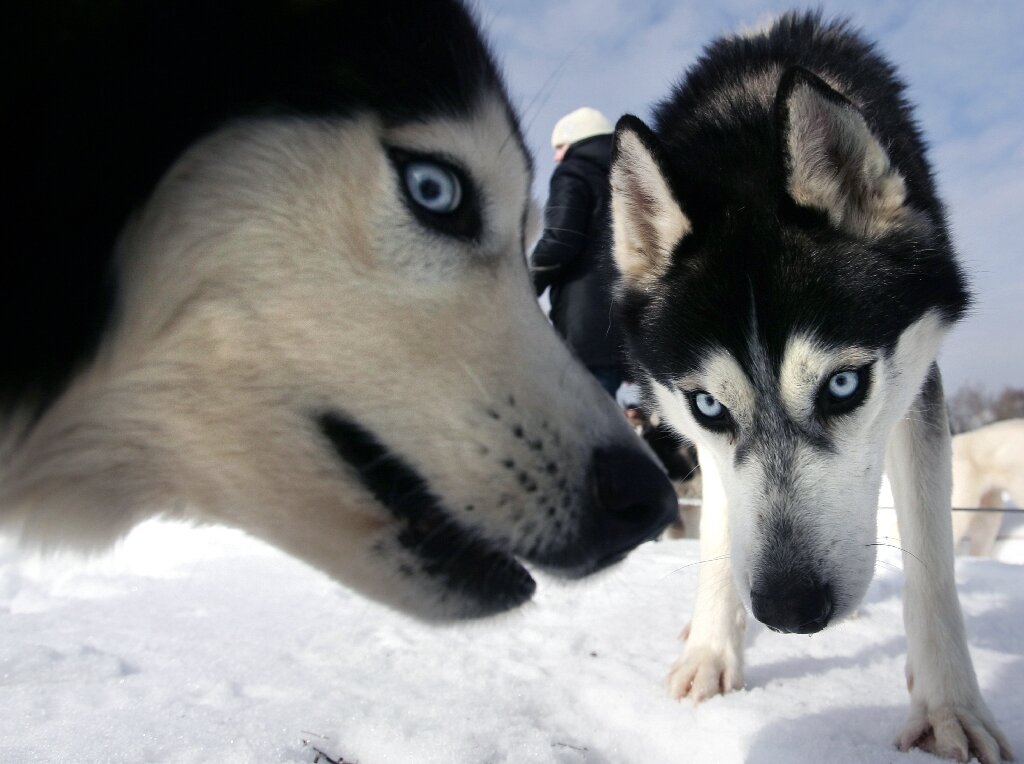- July 23, 2022
- No Comment
- 9 minutes read
Ancient Siberian dogs relied on humans for seafood diets – Phys.org

Click here to sign in with or
Forget Password?
Learn more
share this!
347
23
Share
Email
July 22, 2022
by Issam AHMED
As early as 7,400 years ago, Siberian dogs had evolved to be far smaller than wolves, making them more dependent on humans for food including sea mammals and fish trapped below the ice, a new study showed Friday.
Robert Losey of the University of Alberta, who led the research published in Science Advances, said the findings helped explain the growth in the early dog population, as people put them to work for hunting, herding and sledding.
“The long term changes in dog diet have really been oversimplified,” he told AFP, explaining that prior work had focused only on two main ideas to explain how dogs transitioned from wolves, a process that began some 40,000 years ago.
The first of these was that friendlier wolves approached human camps during the Ice Age to scavenge for meat, eventually became isolated from their wild counterparts, and were then intentionally bred into dogs.
The second was that some dogs evolved a better capacity to digest starches following the agricultural revolution, which is why some modern dog breeds have more copies of the AMY2B gene that creates pancreatic amylase.
To study ancient dog diets in more depth, Losey and colleagues analyzed the remains of around 200 ancient dogs from the past 11,000 years, and a similar number of ancient wolves.
“We had to go to collections all over Siberia, we analyzed those bones, took samples of the collagen, and analyzed the protein in labs,” he said.
Based on the remains, the team made statistical estimates for body sizes.
They also used a technique called stable isotope analysis to generate dietary estimates.
They discovered that dogs of 7,000-8,000 years ago “were already quite small, meaning that they just couldn’t do the things that most wolves were doing,” said Losey.
This in turn led to greater dependence on humans for food, and reliance on small prey and scavenging, rather than prey bigger than themselves, which wolves hunt.
“We see that dogs have marine diets, meaning they’re eating fish, shellfish, seals and sea lions, which they can’t easily get themselves,” he said.
Ancient dogs were found to be eating fish “in areas of Siberia where the lakes and rivers are frozen over for seven to eight months of the year.”
Wolves of the time, and today, were hunting in packs and mainly eating various species of deer.
Benefits and challenges
These new diets brought dogs both benefits and challenges.
“Beneficial because they could access stuff from humans, and those are oftentimes easy meals, but it came with the costs of all these new diseases and problems, like not enough nutrition,” said Losey.
While the new bacteria and parasites they were exposed to could have helped some adapt, some dog populations might not have survived.
Most of the first dogs of the Americas died out, for unclear reasons, and were replaced by European dogs—though it’s not thought colonization was to blame.
Those dogs that did survive acquired more diverse gut microbiomes, helping them further in digesting more carbohydrates associated with life with humans.
Explore further
© 2022 AFP
Facebook
Twitter
Email
Feedback to editors
21 hours ago
0
22 hours ago
0
22 hours ago
0
23 hours ago
0
Jul 21, 2022
2
7 hours ago
17 hours ago
19 hours ago
19 hours ago
20 hours ago
21 hours ago
22 hours ago
36 minutes ago
37 minutes ago
42 minutes ago
48 minutes ago
1 hour ago
1 hour ago
More from Physics Forums | Science Articles, Homework Help, Discussion
May 18, 2022
Jun 29, 2022
Nov 09, 2016
Jan 27, 2022
Jun 28, 2022
Oct 21, 2021
19 hours ago
22 hours ago
Jul 22, 2022
Jul 21, 2022
Jul 21, 2022
Jul 21, 2022
Use this form if you have come across a typo, inaccuracy or would like to send an edit request for the content on this page. For general inquiries, please use our contact form. For general feedback, use the public comments section below (please adhere to guidelines).
Please select the most appropriate category to facilitate processing of your request
Thank you for taking time to provide your feedback to the editors.
Your feedback is important to us. However, we do not guarantee individual replies due to the high volume of messages.
Your email address is used only to let the recipient know who sent the email. Neither your address nor the recipient’s address will be used for any other purpose. The information you enter will appear in your e-mail message and is not retained by Phys.org in any form.
Get weekly and/or daily updates delivered to your inbox. You can unsubscribe at any time and we’ll never share your details to third parties.
More information Privacy policy
Medical research advances and health news
The latest engineering, electronics and technology advances
The most comprehensive sci-tech news coverage on the web
This site uses cookies to assist with navigation, analyse your use of our services, collect data for ads personalisation and provide content from third parties. By using our site, you acknowledge that you have read and understand our Privacy Policy and Terms of Use.

